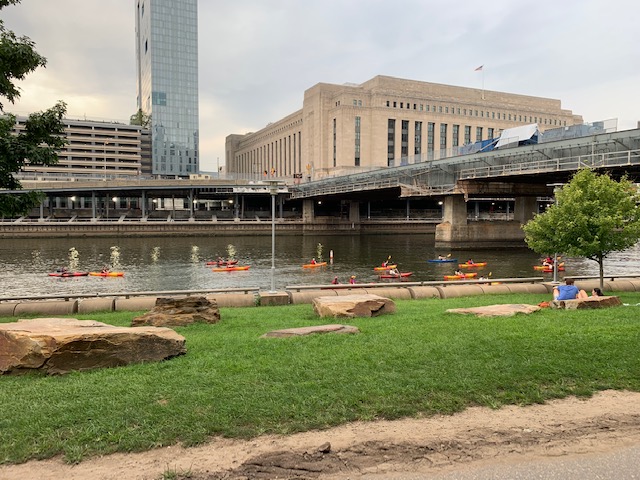Fishable, Swimmable Waters: A Learning Series
The Clean Water Act passed almost half a century ago, leading to the creation of science-backed standards and people-focused protections that still guide our work today. But despite decades of progress, there is still much more to be done to bring the full promise of the Clean Water Act to our communities.
The videos below complete a series of panel presentations by WPF grantees showcasing innovative ways they’re putting the Act to work. The Foundation's Watershed Protection Program strategies typically support and encourage "like" organizations to work together; however, there is emerging opportunity for organizations to collaborate across these strategies, with Clean Water Act stream designations as a focus of the work. Partnering across watershed strategies, panelists have combined community voices, recreational experiences, monitoring programs, and smart policy to win enhanced protections, improved standards, and greater access to fishable, swimmable waters. For further learning, visit https://tinyurl.com/FSWstorymap.
Panel 1: Lessons from the Clean Water Act Regulatory Landscape: Permits, Policies, and Advocacy Opportunities
Speakers:
- Doug O’Malley (Executive Director, Environment New Jersey) presents on the campaign to upgrade New Jersey’s waterways to Category One protected status.
- Abby Jones (Vice President of Policy & Legal, Penn Future) shares ways in which High Quality and Exceptional Value (HQ, EV) protected status for waterways can be used to fight pollution permits.
- Jennifer Orr-Greene (Eastern Policy Director, Trout Unlimited) shares experiences working with the Pennsylvania Fish and Boat Commission, and Department of Environmental Protection, to upgrade waterways to HQ and EV status.
- Maya van Rossum (CEO & Delaware Riverkeeper, Delaware Riverkeeper Network) talks about efforts to upgrade protections and fight pollution permits on the mainstem Delaware River.
Panel 2: Fishable, Swimmable Standards: How Clean Water Act protections are backed by monitoring data and powered by community science
Speakers:
- John Jackson (Senior Research Scientist, Stroud Water Research Center) shares ways in which purposefully designed monitoring programs in PA have led to upgrades and better enforcement of water protections.
- Mike Pisauro (Policy Director, The Watershed Institute) shares lessons learned from the Institute’s partnership with the New Jersey Department of Environmental Protection on community science and community monitoring.
- Nancy Lawler (Water Quality Program Coordinator, Musconetcong Watershed Association) shares a window into Musconetcong’s robust monitoring program, connecting e-coli levels to water protections.
- Erik Silldorff (Restoration Director, Delaware Riverkeeper Network) discusses how data has been instrumental is advocating for better standards and protections for the mainstem Delaware River and the Cooper River in New Jersey.
Panel 3: Water Power: Building support for water protections through recreation, communications, and community outreach
Speakers:
- Erica Baugh (Program Director, Upstream Alliance) shares her experiences raising awareness for Cooper River protections through paddling events with the NJDEP and the Mayor of Camden.
- Jim Cummings (Director of Experiential Learning, Urban Promise) shares the story of working with Camden youth to provide testimony on NJ’s Category One upgrade.
- Emily Rinaldi Baldauff (Campaigns Director, PennFuture) shares successes and lessons from the Our Pocono Waters Campaign – an effort that aligns recreation outfitters, local businesses, and community groups in a branded effort to keep HQ and EV streams protected.
- Rob Shane (Mid-Atlantic Organizer, Trout Unlimited) discusses engaging anglers in the HQ and EV upgrade process as part of the PA Fish and Boat Commission’s Unassessed Waters Initiative.
Published: September 2020

